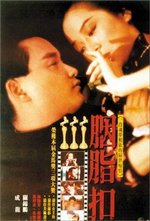
ROUGE
Leslie Cheung.
Hong Kong, 1987, 96 minutes, Colour.
Directed by Stanley Kwan.
Rouge is an interesting and entertaining Hong Kong film. It is elegantly made, designed, photographed, edited. It is a ghost story - made almost plausible.
The film contrasts Hong Kong of 1934 with that of 1987. Extraordinary changes are manifest in Chinese society. The latter day feudal traditions of the 30s give way to the very modern, even yuppy styles of the 80s.
The film focuses on a courtesan and her love for an actor. They attempt suicide in 1934 but the heroine, Fleur, does not meet her lover in the next world and comes back to find him. She arrives in 1987 and is helped by a young journalist couple. The film is very well acted, presents the characters and the action with a great sense of dignity and mystery. it is interesting to see as a contrast with the martial arts style action movie Hong Kong (which is briefly seen and spoofed in this film). It is also accessible to western culture.
1. The Hong Kong film industry? This romantic exploration of character and themes compared with martial arts films? A romantic ghost story?
2. The settings: Honk Kong in the 30s, the restaurant, the costumes and decor, the theatre? The contrast with the 80s. the modern style, malls and theatres, clothes, westernization? The contrast with decor and atmosphere, costumes? The inclusion of Chinese songs?
3. The opening and Fleur and her rouging her face? The finale with her looking again at the audience? The world of the courtesans, victims of society? Male and Female relationships Fleur and her masculine costumes singing the song? The parties? The Twe1fth Master? The group, the celebration, his infatuation? In love with Fleur? The exotic mystery about her? The pressure of his family, his mother, the intended marriage? His work and training as an opera singer?
4. The portrait of Fleur: The rouge and the make-up, singing her song, her attraction towards The Twelfth Master, in love? Her appearance in 1987, with the journalist, the advertisement and the number, the mystery of her appearances, her sadness? Following Yuen? The meal, the money? The mystery and her story? Eating and listening, Helping? Her memories? Their being in the market, finding the newspaper with the information? The flashbacks and her telling the couple of her love for The Twelfth Master, the suicide pact, the opium, the pills and the drink? Ah Chor and her revulsion?
5. Yuen and his protectiveness, wanting to help? Going to the theatre, seeing the action film being made, the search for The Twelfth Master, finding him, the rouge box, her grief? In defeat? Going into Eternity? The portrait of a dignified woman? Her victim? The Chinese world of ghosts, eternity, hell? Truth, re-incarnation?
6. Yuen and Ar Chor: at work, the advertisement, the encounter with Fleur? Yuen at the office, the meal? Very ordinary, their work as journalists? Ar Chor and her investigations? Their life together, living together - and the contrast with ancient Chinese traditions? Argument, puzzle? The market and seeing the papers? Finding The Twelfth Master's son and hearing his story? The moviemaking, the theatre? Finding The Twelfth Master? Their own relationship - and Ar Chor's growing sympathy with Fleur?
7. The Twelfth Master: a pleasant young man, his love for Fleur, the pressure of his family? His not dying? The experience of the suicide pact? His estranged son? Decrepit,
the confrontation with Fleur? A failure?
8. A film of moods, contrast of eras, pathos, love?